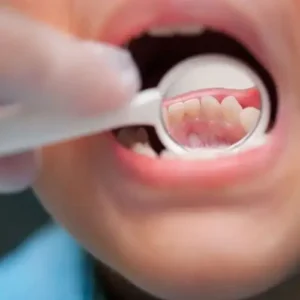A woman just diagnosed with Chronic Periodontitis was not thinking of her own health as she sat in the dental office. Instead, she wanted to know if her children were at risk too.
It’s a common question, said Dr. Michael Quinn, a Periodontist with 14 years of experience who practices at several Coast Dental locations in Atlanta, Georgia. “The short answer is no. Gum disease is not like the common cold. You cannot transmit gum disease to your children through kissing or using the same silverware,” Dr. Quinn explained. “It’s true that bacteria in mom’s mouth can be transmitted to the child’s mouth. But the bacteria that cause chronic periodontitis need to be in just the right spot in just the right amount in just the right ecological niche to cause harm. This just doesn’t happen.”
The children’s immune response to fight infection and their inflammatory response are different than in adults, and do not allow the gum disease-causing bacteria to take hold.
Chronic periodontitis is an infection of the gums caused by the build-up of plaque, a sticky material made of bacteria and food debris that accumulates on the tooth. If the plaque is not removed by brushing and flossing daily, then it hardens into a substance called tartar. Tartar pushes the bacteria deeper into the gum tissue, which irritates and inflames the gums. The bacteria cause the gums to become infected and swollen and to pull away from the tooth, creating pockets where more bacteria will accumulate. If the infection is allowed to fester, the disease destroys the gum tissue and bones, and your teeth could become loose and eventually fall out or need to be extracted.
In the rare occasions when children do have periodontitis, it is usually Aggressive Periodontitis, which can be associated with a systemic disease like Diabetes, Leukemia or Down Syndrome, Dr. Quinn said. In a survey of 263 Type I diabetics, 11 to 18 years of age, 10 percent had overt periodontitis, according to the American Academy of Periodontology. Children with Down Syndrome may have teeth that are not well-aligned, creating more areas where bacteria may be trapped and lead to infection. It’s important these kids follow their dentist’s advice, using the types of toothbrushes, toothpaste and floss recommended for their particular condition. Often, their pediatric dentist will recommend they see a periodontist for further evaluation and treatment.
Even though most children aren’t susceptible to the most devastating kinds of gum disease, kids do suffer from Chronic Gingivitis. Chronic Gingivitis is the first stage of gum disease, and the only stage that is reversible. Symptoms may include red or puffy gums which may bleed when brushed. If your child sees blood in the sink or on the toothbrush, the child needs to see a dentist.
“I cringe when I see a mom point a finger at a kid and say, ‘I told you that you should be brushing,'” Dr. Quinn said. “Good habits start with the parents checking the kids’ oral hygiene habits, watching them brush their teeth and checking their gums to make sure they’re not red or swollen. Parents should be brushing and flossing their children’s teeth until the kids are old enough to do it themselves. Most children will still need supervision until they are comfortable doing it correctly by themselves.”
While Chronic Gingivitis is often a sign of poor oral hygiene, tweens and teenagers can have hormonal gingivitis. Girls are most susceptible to gingivitis when they are menstruating. Older teenagers, age 16 through 19, start to be susceptible to more advanced forms of periodontitis. It can be exacerbated if the teenagers are not brushing or flossing, or if there is family history of gum disease.
“If one of my patients has no medical conditions but does have Aggressive Periodontitis, I tell them to tell everybody in their family – brothers, sisters, parents, aunts, uncles and children,” Dr. Quinn said. “They need to know there is a family history, and their family members need to tell their dentists so they can be extra vigilant during exams. Since Aggressive Periodontitis runs in families, it’s very important the children’s dentist knows to look for it.”
The good news is most children won’t have to worry about periodontitis when they’re young, and if they brush their teeth correctly and floss daily, they may be able to avoid getting gum disease forever.  Michael Quinn, DMD, has been a practicing dentist since 1987. He is a Board Certified Periodontist and provides periodontal services to patients starting at age 8. Special services include all periodontal services, bone grafting, crown lengthening, dental implants and restorations, endodontic surgery, extractions, gummy smile treatment, periodontal disease management, pre-prosthetic surgery, ridge augmentation, soft tissue grafts and sinus lift. He practices at several Coast Dental offices in Georgia including ones in Atlanta, Marietta, Fayetteville, Lawrenceville, and Stone Mountain.
Michael Quinn, DMD, has been a practicing dentist since 1987. He is a Board Certified Periodontist and provides periodontal services to patients starting at age 8. Special services include all periodontal services, bone grafting, crown lengthening, dental implants and restorations, endodontic surgery, extractions, gummy smile treatment, periodontal disease management, pre-prosthetic surgery, ridge augmentation, soft tissue grafts and sinus lift. He practices at several Coast Dental offices in Georgia including ones in Atlanta, Marietta, Fayetteville, Lawrenceville, and Stone Mountain.
Reviewed by: Michael Quinn, DMD
Reviewed by: Charbel Klaib, DMD
Reviewed by: Chuck Laun, DDS
Related Posts

Gum Disease Linked to Heart Disease and Stroke
Can brushing and flossing actually save your life? Researchers are asking that question as they learn more about the link

Gum Disease and Diabetes: What You Should Know
Research shows that your oral health is linked to numerous systemic diseases, including diabetes. There are many health complications of

COVID-19 patients with gum disease 9 times more likely to die, study says
Brushing your teeth regularly and maintaining proper oral care can play a big role in the fight against COVID-19 —
